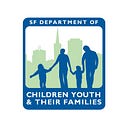Giving Participants a Sense of Stability, Purpose, and Financial Empowerment: We Are the City Spotlight on Bridges from School to Work
By Anthea Charles, Director of Bridges from School to Work
For the past thirty years, Bridges from School to Work (Bridges) has thrived in serving participants because our program model is based in providing highly customized services. Over 90% of our services are 1:1, in-person encounters in which Bridges mentors and participants build trust and become partners who build a path (or “bridge”) that leads to successful employment. And then on March 17, 2020, everything stopped.
For a couple of days we panicked, wondering if we’d be able to provide any programming. There were so many questions: was it appropriate to help youth find jobs during a shelter-in-place order? Shouldn’t we all be in lockdown? Would the parents and caregivers of participants under 18 allow them to work, even if the youth wanted a job? And most importantly, how did we keep our students safe, if they needed to work to contribute to their family income? We didn’t have answers to all these questions, but it was quickly apparent that our students and their families needed and wanted our services, so we dug deep, got creative and decided we were going to make it work.
Like so many of our youth development partners, I think our program flourished under the strain of the pandemic. Zoom and other video platforms were our best friends, we incentivized program participation with gift cards, and our team met two to three times a week to brainstorm ways to build and strengthen our partnerships with students, employers, schools, and families. For youth who didn’t have the tech or connectivity to meet online, we met in parks and front porches with masks. We bought PPE for youth, paid for ride-shares if they were nervous of public transportation, and were hyper-focused on the safety practices of the employers who were hiring in the essential services our youth provided.
After 18 months of providing hybrid services in an ever-changing landscape, we were able to assist more than 70 participants find work in essential services. Flexibility and creativity were the key in achieving these outcomes and, more importantly, we were able to give our participants a sense of stability, purpose, and financial empowerment in this crazy, crazy time.
One of the most powerful stories from the pandemic times is from one of our participants, who was suddenly let go from his job after nine months. His Bridges mentor talked to his supervisor, who stated that for several weeks the participant had been calling out from work, and that when he was at work he was distracted and lacked engagement. When the Bridges mentor was finally able to reach the participant, he was apologetic and embarrassed. He told his mentor that he couldn’t get himself to go to work anymore because five(!) of his family members had passed from COVID in the past few months!
His mentor immediately let him know that he had nothing to be embarrassed of, and assured him that we were there for him. He took several weeks for self-care and healing, and when he was ready, we assisted him in finding another job with growth potential, because his income was essential to the household. He is excelling in his new position.
This story is difficult to recount, but I think it needs to be told because it highlights the resiliency of our participants and the heavy toll that COVID has taken in communities of color.
As a member of our team said, “I believe that San Francisco is an amazing place to grow up because of our progressive and innovative culture. I love that we are a health-conscious city that teaches youth about wellness from a young age.” I would add that I was so impressed that our community response to the pandemic was so proactive. San Francisco and the rest of the Bay were on the vanguard of policy decisions that resulted in some of the highest vaccination rates in the country. We’re beating COVID because of our history of activism and social responsibility.
In order to help children, youth, and families thrive, it’s essential that we provide free, reliable internet connectivity to all communities. We need community hubs — in addition to libraries — that provide technical assistance to neighborhoods. Most youth have devices, but they aren’t able to connect to the internet and need assistance troubleshooting through obstacles. We need tech-trucks in neighborhoods just like we have taco-trucks.
Please share a song that comes to mind when you think of everything that has transpired for you or your program during the pandemic.
Sheesh…let’s go with “I Can See Clearly Now.” It’s still aspirational, but I know the bright, sunshiny day is just around the corner.
